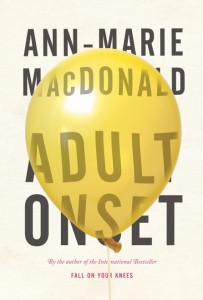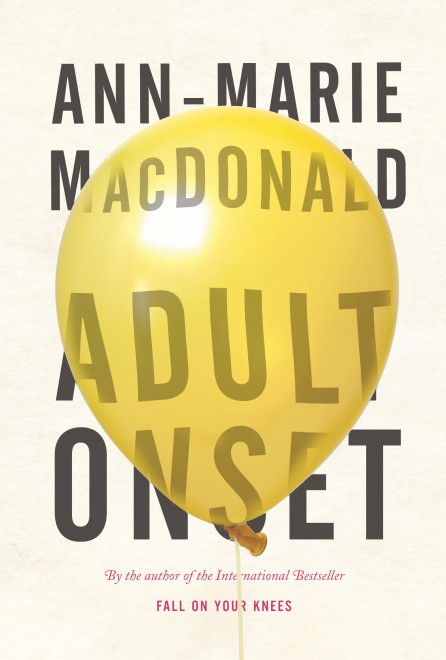 Adult Onset
Adult Onset
by Ann-Marie MacDonald
Tin House Books. 388 pages, $25.95
ADULT ONSET spans one week, but from within that boundary it frequently comes unstuck in time. Its fictional world presents a calm outward surface, but there’s turmoil churning just underneath. These contrasts build and clarify, stretching into a portrait of how we live today while acknowledging that change is really the only constant.
Mary Rose MacKinnon struggles to answer an e-mail from her father; he’s learned to use the computer just to tell her he watched her “It Gets Better” spot on YouTube. This is a miracle on many levels: above all, because the parents who once reviled her for being a lesbian now embrace her along with her wife and two children. Mary Rose is a stay-at-home mom, which allows her to put off writing the third book in her successful young adult trilogy. At 48, she still gets stopped for autographs, and she’s perpetually exhausted. But what seems like a wonderful if overstuffed life keeps veering toward terror. Mary Rose’s temper can turn abusive, and she’s beginning to connect the dots about an illness in her early childhood that may be influencing her now.
The story is set in Toronto, where author Ann-Marie MacDonald lives with her wife and two kids. One hopes the scene in which Mary Rose idly spots Margaret Atwood driving around on errands in the neighborhood is drawn from life. Long-term couples will nod in recognition at the arguments between Mary Rose and wife Hilary, who’s working on a play and checks in by phone. Affection can turn into recrimination, then flirtation, then build toward World War III before both parties realize it’s getting late and lay down their arms. When she can’t be reached by phone, Mary Rose worries that Hilary’s been in an accident or that she’s having an affair. “Does she have Mary Rose down as next of kin? Of course she does, they are married. As long as Hil is killed in Canada, Mary Rose will be the first to hear.” By the time you read this, that list may have grown longer still. This is a world in which the ground is always shifting, leaving us to grasp for facts that we once knew to be true, then waiting for the brain to buffer and update.
Dolly, Mary Rose’s mother, is showing signs of dementia that frequently echo Mary Rose’s own exhausted disorganization. Some reflexive cruelties remain despite her mellowing in other respects. Dolly’s history is marked by numerous losses: Mary Rose is one of three surviving siblings when there should be eight in total. She is in fact named for one of her unfortunate predecessors, now referred to as “other Mary Rose.” Grief runs bone deep in the family, and as Dolly’s thoughts become less grounded in reality, it’s hard to distinguish what might be nonsensical rambling from admissions of guilt, and whether they refer to real or imagined crimes.
MacDonald handles her material gracefully, never letting things slide into excessive sentiment or horror. Many scenes are darkly hilarious: a woman Mary Rose idealizes reveals a psyche just as bruised as her own by parenthood; the syncing of events between datebooks and calendars becomes a slapstick ballet; and just as things begin to get better, Mary Rose steps out to buy flowers and blithely looks at potential bridges to jump from. Flashbacks to her childhood that begin to make more sense over time and scenes from the first two books in her young adult series air out the narrative while also offering up clues as to what’s behind Mary Rose’s breakdown.
If a week inside Mary Rose’s head feels like a long time, it’s only because it’s so painfully familiar. Anyone who has ever looked into a kitchen junk drawer and seen a perfect metaphor for her own mind will greet her as a kindred spirit. The spouse, the kids, the dog, the aging parents only turn up the volume of what is already frightening in its chaos. The happy moments feel like Polaroids that didn’t quite turn out. Adult Onset is a contemporary slice of life that speaks to how far we’ve come—as women, as lesbians, as parents—while acknowledging how often we impede our own progress.
_____________________________________________________
Heather Seggel is a writer loosely based in Northern California.





